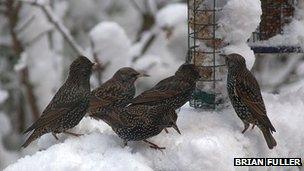RSPB recruits farmers for starlings count
- Published

Starling numbers across the UK have declined by 80% since 1979
Farmers in Somerset and Gloucestershire are helping national bird charity the RSPB to investigate the decline of Britain's starlings.
Experts will research whether the birds have sufficient food and nesting sites in both counties.
Numbers across the UK have declined by 80% since 1979 and by nearly a third in the past 10 years.
Across Europe it is thought 40 million of the birds have disappeared over the past three decades.
"Our records show that we have lost more starlings across Europe than any other farmland bird," said Dr Richard Gregory, from the RSPB's bird monitoring section.
"Forty million starlings lost represents over 150 for every hour since the 1980s.
"This loss should be a wake-up call, because we ignore the decline of nature at our own peril."
'Practical' solutions
It is thought a loss of grassland through conversion to forestry land and the growing of crops could be linked to the reduction of numbers across Europe.
In the UK, the British Trust for Ornithology has said <link> <caption>intensively farmed land made it more difficult</caption> <url href="http://www.bbc.co.uk/nature/17523815" platform="highweb"/> </link> for the birds to find their favourite food - cranefly larvae that live in undisturbed soil.
Martin Harper, the RSPB's conservation director, hoped the research would yield the answers to ensure the species has a secure future.
"Understanding exactly what is causing these declines will allow us to develop practical and cost-effective solutions for land managers and farmers," he said.
"These could then be delivered through wildlife-friendly farming schemes and other policy interventions."
Starling numbers have been tracked by the RSPB's annual <link> <caption>Big Garden Birdwatch</caption> <url href="http://www.rspb.org.uk/birdwatch/results.aspx" platform="highweb"/> </link> , the world's biggest wildlife survey.
Since it began in 1979, the average number of starlings spotted by participants has dropped from 15 to just three.
- Published29 March 2012
- Published29 March 2012
- Published6 January 2012